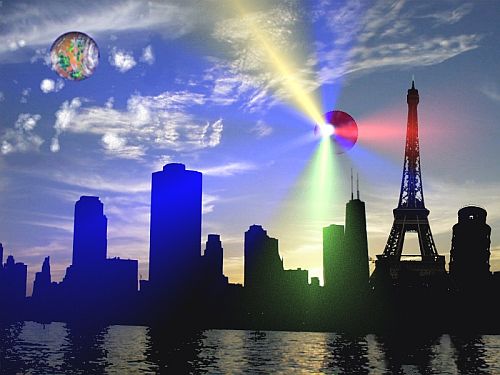Boogie is a noun born in the USA, around the beginning of the 20th century. Actually, it a has a pair of main meanings, a style of blues music, and dancing to pop or rock music. Given the importance of that noun in the sector of nightclubs and in the industry of dance music, I’ve read all I found on the web about the etymology. Surprisingly, there are various theories, and no one of them is prevailing. The page serves to explain the most reliable theories, and to propose a new theory, personal and, honestly, with scarce confirmations. However, I find my theory convincing, and useful to let non-Americans understand something about popular mentalities of Americans.
Theory 1, dates back to 1917 – “boogie” was a kind of rent party. When poor black people were unable to make the rent, they organized a party with alcohol and music, in order to raise the money to avoid eviction.
Theory 2, is rooted to 1340 – “boogie” is a contamination of a word in ancient Latin (bulgarus), related to the inhabitants of Bulgaria, that appeared in Medieval, English writings as “bougre”, a synonym of heretic. In the 19th century, it was popularized in America as “bugger”, and as “bogy (or bogie)”. A “bugger” is the author of depreciable acts, such as sodomy. “Bogy” is one of the many names of the devil, that, a few years before the birth of boogie-woogie, became “bogey”, a derogatory term for “negro”.
Theory 3, the Irish origin – an author sustains that “boogie” has come from “bogadh”, an Irish noun related to moving, or dancing.
Theory 4, the African origin – “boogie” derives from “bogi”, a term utilized in Sierra Leone, which means dancing.
Theory 5, the evolution of a traditional insult – “boogie” is a variation of “bourgie”, a snob person who aspire to a be a part of the upper middle class. The etymology is the French word “bourgeois”. They say that the described adaptation was normally directed to persons of black ethnicity, even if there’s no explanation of the language process.
I think that all the reported theories have something of appreciable. My preference goes to the theory 5, because I’ve found the way to reconstruct the language process that might have led to “boogie”. In my opinion, boogie was not immediately a single word, but two different words, the union of “boo” and “oogie”. Well, according to my findings, after the declaration of illegality of brothels (1910), prostitution became a practice largely spread among black ethnicity, especially of the female genre. Sometimes, a black prostitute was making notable amounts of money, and the fact originated a popular insult. While “boo” is a simple expression of disapproval utilized since the 18th century, the word “oogie” came from a misspell of the ancient Latin word “orgia”. In effect, among other meanings, “oogie” can mean “excretion of something like mucus”, and can describe a sexual practice, similar to an improper reception/ingestion (I let you imagine the details). A “boo-oogie”, that soon was contracted into “boogie”, was a black female with money, who was provoking envy to other black females. Enviers started to call her “boogie”, and it meant that the money was earned through immoral practices, corresponding to unnamable reception/ingestion.
Of course, the mix of the page is entirely made of disco boogie, from the 70’s and the 80’s. Nevertheless, the mix is new, because it contains some tracks that can be properly mixed only with DJ software, and are practically impossible to employ with traditional turntables, especially live at clubs.
File name is “from insult to tasty tune, that’s boogie, by Max Look DJ (Aug 2024)”, 1 hour 21’ and 15” of classic disco boogie. Some of the tracks were not loved by professional disco DJs of nightclubs.
What boogie has become, the playlist:
Dennis Coffey – boogie magic (1977)
John Ozila – funky boogie (original 12”, 1979)
Hot Chocolate – mindless boogie (extended mix 1979)
Al Jarreau – boogie down (extended mix, 1983)
Eddie Kendricks – boogie down (LP version, 1974)
Mantus – boogie to the bop (1980)
Rafael Cameron – boogie’s gonna get ya (extended mix, 1981)
A Taste of Honey – boogie oogie oogie (original mix 1978)
Gap Band – baby baba boogie (1979)
Idris Muhammad – boogie to the top (1978)
Beautiful Bend – boogie motion (1978, short version)
Cleveland Eaton – bama boogie woogie (mix 1978)
Lamont Dozier – boogie business (1979)
Rokotto – boogie on up (1977)
Earth Wind & Fire – boogie wonderland (1979)
Wardell Piper – captain boogie (1979)

